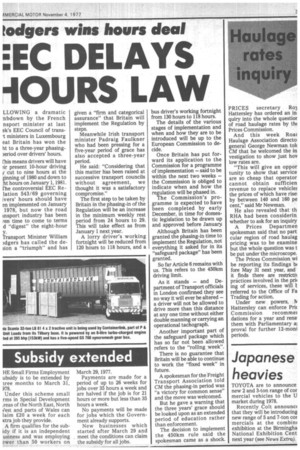lodgers wins hours deal
Page 5

If you've noticed an error in this article please click here to report it so we can fix it.
EEC DELAYS lOURS LAW
LLOWING a dramatic nbdown by the French nsport minister at last ek's EEC Council of transt ministers in Luxembourg eat Britain has won the ht to a three-year phasing)eriod over drivers' hours.
['his means drivers will have !ir present 10-hour driving yr cut to nine hours at the ginning of 1980 and down to ,ht hours on January 1, 1981. file controversial EEC Relation 543/69 governing ivers' hours should have en implemented on January 1978, but now the road insport industry has been len time to come to terms d "digest" the eight-hour y.
Transport Minister William Agers has called the deion a "triumph" and has given a "firm and categorical assurance" that Britain will implement the Regulation by steps.
Meanwhile Irish transport minister Padraig Faulkner who had been pressing for a five-year period of grace has also accepted a three-year period.
He said: "Considering that this matter has been raised at successive transport councils without agreement, we thought it was a satisfactory compromise."
The first step to be taken by Britain in the phasing-in of the Regulation will be an increase in the minimum weekly rest period from 24 hours to 29. This will take effect as from January 1 next year.
A lorry driver's working fortnight will be reduced from 120 hours to 118 hours, and a bus driver's working fortnight from 130 hours to 118 hours.
The details of the various stages of implementation and when and how they are to be introduced will be up to the European Commission to decide.
Once Britain has put forward its application to the Commission for a programme of implementation — said to be within the next two weeks — the Commission is obliged to indicate when and how the • regulation will be phased in. The Commission's programme is expected to have • been completed by early December, in time for domestic legislation to be drawn up and approved before January Although Britain has been granted the phasing-in time to implement the Regulation, not everything it asked for in its "safeguard package" has been granted.
So far Article 6 remains with us. This refers to the 450km driving limit.
As it stands — and Department of Transport officials in London confirmed they see no way it will ever be altered — a driver will not be allowed to drive more than this distance at any one time without either double manning or carrying an operational tachograph.
Another important part of the safeguard package which has so far not been allowed refers to the "rolling week".
There is no guarantee that Britain will be able to continue to work the "fixed week" in future.
A spokesman for the Freight Transport Association told CM the phasing-in period was "a victory for common sense" and the move was welcomed.
But he gave a warning that the three years' grace should be looked upon as an extended period of education rather than enforcement.
The decision to implement the 450km rule said the spokesman came as a shock.
















































































































